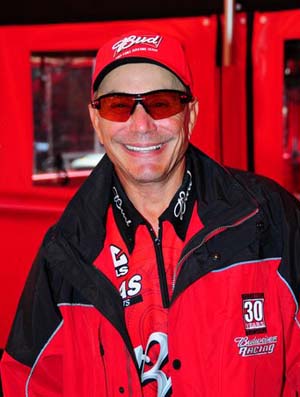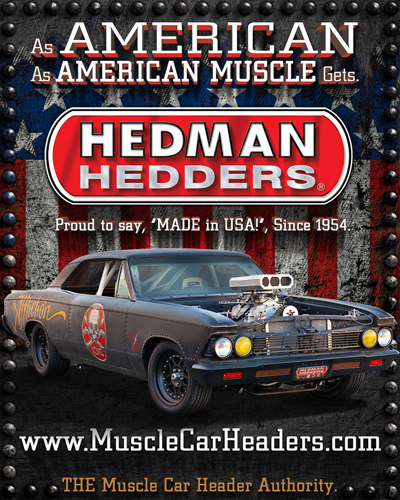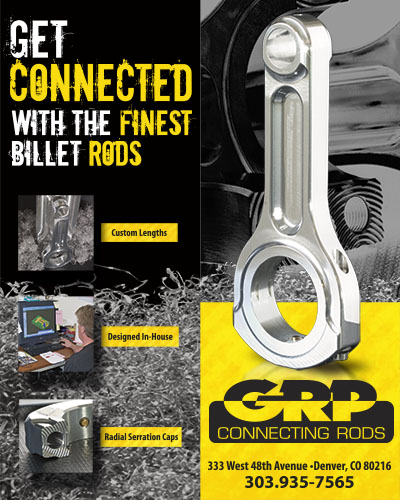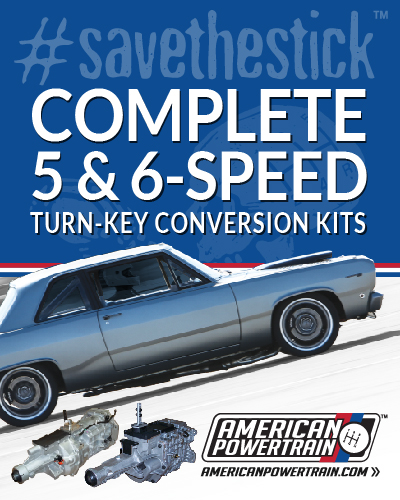CLYDESDALES CAN’T DRAG BERNSTEIN BACK, BUT HE KEEPS EYE ON SPORT
 NHRA fans were conditioned to seeing Kenny Bernstein at Pomona, Calif. – in the winners circle. He earned eight Wally trophies there, five in Top Fuel (four at the Finals, one at the Winternationals) and three in Funny Car (two at the season finale, one at the opener).
NHRA fans were conditioned to seeing Kenny Bernstein at Pomona, Calif. – in the winners circle. He earned eight Wally trophies there, five in Top Fuel (four at the Finals, one at the Winternationals) and three in Funny Car (two at the season finale, one at the opener).
But those who caught a glimpse of him last month at Auto Club Raceway at Pomona (his first appearance at a racetrack since 2012 at Gainesville, Fla.) saw a far different Bernstein. This Kenny Bernstein wasn’t in a team shirt and crisp slacks or firesuit and racing boots, wasn’t dashing in and out of his hauler lounge for meetings, wasn’t welcoming a client to his pristine hospitality tent. This version was laid back, comfortable in shorts and a T-shirt, tanned and still fit, but with a genuine glow of contentment, no business burdens weighing down his shoulders. Kenny Bernstein was at peace.
That’s because a team of Budweiser Clydesdales couldn’t pull him back into the swirl of sponsorship, behind-the-scenes maneuvering, responsibility for payroll and accountability for every penny he spends, demands on his time, and a constant testing of his patience. That endearing trademark grin that almost literally spreads from temple to temple comes from pure satisfaction. It’s pure fulfilment, knowing that he won six NHRA championships and 69 races, qualified first 66 times, and was the first of only three drag racers to earn titles in two different pro classes (pre-dating Gary Scelzi and Del Worsham). It’s knowing that he left his mark, as well, as a successful team owner in both the IndyCar world and NASCAR. And a massive part of his gratification comes from knowing he doesn’t have to immerse himself in any of those operations – or any other – again.
“We miss a lot of parts of this thing, by all means. Certainly one and above all, all our friends. Which this was our home for 40 years, so that’s a tough thing to give up and go away from. The fans, and the press, everything that was about it,” Bernstein said.
 “I certainly miss the driving part, and I always have. I missed it even when Brandon was driving. But the decision I made at the time was correct, and it turned out to be correct, “ he said. “A little suffering through it the first couple of years to get adjusted, but once we got adjusted to it, I look at it and I say to myself, ‘OK, you want to get busy again, well then get in another business.’ And then I stop and remember the sides of the business that you don’t enjoy that much, and said, ‘Nah, not going to do that.’ Any business. Because I did, for the first couple years - I thought, ‘You know, I don’t know if I’m going to be able to hack this doing nothing and just playing golf every day and working out and all that, and traveling. That’s fun and I love it, but how long you going to be able to do this?’
“I certainly miss the driving part, and I always have. I missed it even when Brandon was driving. But the decision I made at the time was correct, and it turned out to be correct, “ he said. “A little suffering through it the first couple of years to get adjusted, but once we got adjusted to it, I look at it and I say to myself, ‘OK, you want to get busy again, well then get in another business.’ And then I stop and remember the sides of the business that you don’t enjoy that much, and said, ‘Nah, not going to do that.’ Any business. Because I did, for the first couple years - I thought, ‘You know, I don’t know if I’m going to be able to hack this doing nothing and just playing golf every day and working out and all that, and traveling. That’s fun and I love it, but how long you going to be able to do this?’
“And I said, I think what I’ll do is I’ll go get a car dealership or maybe a motorcycle dealership or an ATV dealership. Something that I would enjoy doing. And then I go into those places,” he said. “I have some friends that have all those things, and I go in and look, and I talk to them, and they go, ‘You don’t want to do this. You don’t want any part of this at all. Think about it, Kenny, now you’re going to be back in here every day, 24 hours a day, because you’re not one that’s going to walk away from it and turn it over to somebody, correct? And secondly, now you got payroll, you got customers, you got problems. Believe me, you don’t want to get back in this’. And the more I thought about it, they were right.”
Oh, he has enjoyed “this doing nothing.” The view of the Pacific Ocean from his home in Corona del Mar helps. John Force always joked that Bernstein “has a beautiful home, but every weekend he lives in my trailer park.” Well, adios to the trailerhood. Bernstein isn’t hitched there anymore.
He said he and wife Sheryl “travel a lot, I play a lot of golf, I work out, exercise. We took four months in Colorado this summer, which was fantastic. We went up there June 1st and stayed in Aspen and Grand Junction, between the two, until almost October, the 5th or 6th. I got a couple of side-by-side ATV-type things, they call them Utility Side-By-Sides. We rode the mountains all over Colorado, which was absolutely gorgeous and just a blast, just a lot of fun. You’d be surprised – you can stay pretty busy if you really want to. Or, you don’t have to. It’s whatever you really want to do.”
This Kenny Bernstein took a moment to grasp, to fathom, to recognize. But as he spoke about his current lifestyle – so breezy, so free, so full of choices – it was at once inspiring and dreamlike, yet simply evidence of the circle of responsibility, that earning-a-right ethic that his father Bert Bernstein instilled in him as a kid in Lubbock, Texas. Kenny Bernstein has earned the right to live a champion’s lifestyle, one of his choosing. And by no means is it idle.
“When we go to Colorado, we’re extremely busy,” he said. “Sheryl’s from there, the family’s there, there’s 22 people there. We’re always doing something, and they’re all outdoorsmen because that’s the way they were raised and grew up. So I’ve picked up a different side of things that I remember as a kid doing, but now I get to do them again . . . which is kind of fun. I love the mountains when it comes to the summertime. I want nothing to do with snow, not me. But in the summer, you got me up there. It’s beautiful. We get way up high on those Side-by-Sides, 12-13,000 feet, and you just look out as far as you can see, and it’s just awesome. So it’s a lot of fun.
“And we’ve only scratched the surface on riding those UTVs in the mountains, because there’s so many places to go. We just got started. We went to about 10 or 15 different places. There must be another hundred places to go to. So it’s exciting.”
That sunshine-and-nature-and-fitness routine defines Bernstein, but he hasn’t ignored his former life. He keeps up with the NHRA world and certainly has formed his own opinions and observations about its evolution. After humbly sloughing off a suggestion that he might have made a terrific NHRA President, he praised Peter Clifford’s debut in the role and offered some thoughts about the TV package, sponsorship procurement, and The Way It Is Now.
 Even before Bernstein used his clever marketing instincts to secure his three-decade partnership with Budweiser, Tom McEwen spun his magic at Mattel and got the pop-culture-iconic Hot Wheels deal for himself and Don Prudhomme. They ushered in the era of big-dollar corporate deals, and ultimately that’s what bit them.
Even before Bernstein used his clever marketing instincts to secure his three-decade partnership with Budweiser, Tom McEwen spun his magic at Mattel and got the pop-culture-iconic Hot Wheels deal for himself and Don Prudhomme. They ushered in the era of big-dollar corporate deals, and ultimately that’s what bit them.
“That’s the nature of the beast,” Bernstein said, recognizing the trends of business. “When you start out and there’s only two pebbles there, it’s easy to compete against the two pebbles. And then all of a sudden there’s 20 pebbles there and the pie gets cut up. And what happened with us in bringing those sponsors in, opened up this whole door of sponsorship for this sport and other motorsports. And that’s fine, but now you’ve got everybody out in the world basically beating on those sponsors and trying to get them. Consequently it becomes harder. The sponsor looks at it and says to himself, ‘What’s my return on investment here?’. I’m going to spend $15 million, what am I going to get for it? Well that doesn’t pan out, I don’t have the eyes on television, and I’ve got 14 other people in line that will do it for a lot less money.’ So consequently, you create this cycle that we’ve seen, what the last 10 or 12 years or so. So, that’s just the way it goes. Sponsorship bit us – got us in, put us in great shape for a long time, 30 years with Budweiser, but on the other side it came down the other way.”
He agreed that it was a shame.
“It is, but that’s business. That’s what happens,” Bernstein said, looking back by way of example to his Chelsea Street Pub days.
 “You know, when I started my restaurants, back in ’73, and they were all in shopping malls, they were a fast-food service in disguise. They were sandwiches and salads but fast food – we waited on the tables . . . you didn’t go through a line. And the first seven or eight years, we killed them in every mall we were in. There were like 17 of them. And then all of a sudden they opened up a thing called the Food Court. Well, guess what happened? We still did OK, but they hurt us, because now they put the Food Court there, and everybody would go to the Food Court because that’s where all different kinds of food were. So, in essence, like I told [mall mogul] Fred Simon one day, “You took my legs out from under me’, I said, ‘We had a hamburger place, a cafeteria, and the Chelsea Pub. And that was good stuff then. But now you’ve got 19 different food place choices out here to go to. So you made it tougher.’ But that’s what happens. That made the mall better. It made him more money. And it made more people want to come to the mall, because they could have lunch because there’s a lot of places to go. So I understand it all. It’s just part of the game.”
“You know, when I started my restaurants, back in ’73, and they were all in shopping malls, they were a fast-food service in disguise. They were sandwiches and salads but fast food – we waited on the tables . . . you didn’t go through a line. And the first seven or eight years, we killed them in every mall we were in. There were like 17 of them. And then all of a sudden they opened up a thing called the Food Court. Well, guess what happened? We still did OK, but they hurt us, because now they put the Food Court there, and everybody would go to the Food Court because that’s where all different kinds of food were. So, in essence, like I told [mall mogul] Fred Simon one day, “You took my legs out from under me’, I said, ‘We had a hamburger place, a cafeteria, and the Chelsea Pub. And that was good stuff then. But now you’ve got 19 different food place choices out here to go to. So you made it tougher.’ But that’s what happens. That made the mall better. It made him more money. And it made more people want to come to the mall, because they could have lunch because there’s a lot of places to go. So I understand it all. It’s just part of the game.”
He learned – or at least saw the inevitable – that it’s risky for perhaps a hidden reason to be an entrepreneur: people can take your ideas and massage it to introduce the next iteration of it.
“But that’s what happens in life. I mean, that’s what business is all about: improving whatever is there and making it better if you’re trying to carve a niche for yourself,” Bernstein said. “If you’re an entrepreneur, you want to make something work, you look at everything around you and say, ‘How can I make that better?’ Now, some people can look and say they’re going to make it better, and they don’t. But some do. That’s the way it goes. Not everybody’s going to be successful, even if [their idea] is good.”
Racing is no different. The same principles apply.
“Same thing. Exact same thing. It’s all in correlation. Business is business, whether it’s a race team or it’s a restaurant. It doesn’t matter. It all boils down to the same philosophy,” Bernstein said. “It’s marketing, advertising, taking care of the customer, and giving the customer more than they pay for. That’s the key.”
 He said that in motorsports, “my customer was Budweiser. I had to give them more than they paid for. I had to make them understand I was selling that beer out here. I wasn’t just going up and down the racetrack. And so that’s the key to any success in business. My dad taught me that 50-something years ago, and that’s the way he raised me. And he said always give the customer more for their money and they’ll always come back. And he was right. And that’s what you do. It just travels from whatever type of business it is to the next.”
He said that in motorsports, “my customer was Budweiser. I had to give them more than they paid for. I had to make them understand I was selling that beer out here. I wasn’t just going up and down the racetrack. And so that’s the key to any success in business. My dad taught me that 50-something years ago, and that’s the way he raised me. And he said always give the customer more for their money and they’ll always come back. And he was right. And that’s what you do. It just travels from whatever type of business it is to the next.”
Bernstein said he can appreciate why former Top Fuel racer and 1993 champion Eddie Hill never came back out to the races once he stepped from the cockpit.
“Yeah, I can understand - because he probably felt the same thing I did.” At the time, Bernstein said, “The difference was fortunately we still had Budweiser at that time, and he was struggling to get sponsorship dollars.” It just all happened earlier for Hill. And Bernstein said, “When you don’t have the money, there’s no question, unless you want to come out of pocket. And none of us want to come out of pocket.”
The NHRA always has seen a certain percentage of racers who beg, borrow, and give up everything else they might have in life just to drive their race cars. Bernstein said he can recite the reasons a person might do that but can’t relate to why someone would do that.
“I don’t know. I guess their feelings on it are different. Their feelings are a little different than mine, probably. They probably just want to be out here and enjoy the ambiance and drive a race car. And they’d like to win,” he said. “But it maybe isn’t at the top of their game when they know they can’t really go do it and they live with that. And I don’t understand that. But I can see why you would do that. And they also still have hope that the bucket will come around. The big rainbow will come to them and put them where they could compete and be out there. So, if you’re not here, you’re not going to get that. So you’ve got to be exposed. You can’t be away. If that’s what you want to do, then if you can hang on out here and hope that you can scare something up that makes it good for you, then that’s what you should do.”
Perhaps they use Bernstein’s example about taking his race car to the brewery to show executives how the rank-and-file employees loved it. Perhaps they think about John Force’s rags-to-riches story and think, ‘I can be that.’ It takes a really special person to accomplish those achievements, and stories such as Bernstein’s give people hope.
“Well, back when we did it, there was nothing else around, so we had a head start,” he said. “There wasn’t 25,000 people beating on the sponsors. Today everybody of every motorsport type in this country, whether it be motorcycles, or Indy Cars, or NASCAR, or Sprint cars, whatever kind of car, they’re all beating on typically the same sponsor, because you’ve got to go to a sponsor that fits the sport.”
It seems a no-brainer that teams would seek more non-endemic (in this case, non-automotive-related) potential sponsors. Everybody in the grandstands and watching at home buys such items as toothpaste, shampoo, deodorant, food, and paper products.
“All those are fine. You got to go where their customer is sitting in these stands and can be used. But that doesn’t mean you can get them,” Bernstein said. “Right now, you should have a toothpaste company out here, because everybody probably uses toothpaste, right? That’s what you have to do is go after whatever is in the stands that people can use. For instance, motorsports is predominantly a male audience. Now there are a lot of girls in the sport, and there are some sponsors. But a company that sells perfume probably wouldn’t do too good here. So why waste your time on that? Go over here to that Crest company that sells toothpaste, maybe, and talk to them. But you’ve got to talk them into it. And again, it boils down to they all have budgets and it’s all spent in some places and they’re going to put their money where they feel they are going to get the best return on that investment. That’s what it boils down to.”
He said he hasn’t spent time advising the NHRA on ways it could cut costs so that when a team seeks sponsorship, it doesn’t have to ask for $10 million, that maybe someday it could ask for $2 million a year.
“The horse has already left the barn on that one. The horse has left the barn. You never can take these things back,” Bernstein said. “Years and years ago, when Ray Alley was in charge of the fuel side of things, I talked with him a lot. And I said, ‘You guys have got to put some rules on these to stop this continued escalation of spending money, because if the Joneses have this part, the other guy’s got to have it, too’. And I said, ‘All we’re doing here is just spending money after money. How fast do you want these things to go?’. As long as they go 300 that’s all you have to do.”
The fans in the stands don’t know the difference between 320 and 330.
“Not at all – 300 is the magic number, and that’s it,” he said. “That’s the deal. That’s all that is. So, I told [Alley] then, ‘You guys really need to put a stop on this escalation of expenditures and what it takes to run these race cars. Because we’re dummies out here. We’re just going to keep spending and keep inventing. If you say I can do anything over here in this supercharger, I’m going to do it. And then after I do that, the next guy’s going to do more. And the next guy’s going to do more. I just obsoleted 15-20 superchargers. It’s just crazy. You’ve got to stop, but it’s too late now. I think they put some rules on it. They did at the time. I know they put the length of the supercharger. They did some things, sure. They’ve done some things. They have.
 “They did do some things that I’m going to give them credit for. I don’t want to sound like that they did nothing. They did not. They did. Probably just didn’t go hard enough or strong enough,” Bernstein said. “But it’s just these guys are so smart, the Alan Johnsons, the Dale Armstrongs, the Tim Richardses, all these crew chiefs, they’re so smart. If they say you can have it this way, if there is any area in there that they can work in there and make it better, they will. And they have. And that’s what they continue to do. This sport will never, never slow down in that area, because that’s the nature of the beast. You want to outrun the guy next to you, you better try to figure out something that’s better that’s legal.”
“They did do some things that I’m going to give them credit for. I don’t want to sound like that they did nothing. They did not. They did. Probably just didn’t go hard enough or strong enough,” Bernstein said. “But it’s just these guys are so smart, the Alan Johnsons, the Dale Armstrongs, the Tim Richardses, all these crew chiefs, they’re so smart. If they say you can have it this way, if there is any area in there that they can work in there and make it better, they will. And they have. And that’s what they continue to do. This sport will never, never slow down in that area, because that’s the nature of the beast. You want to outrun the guy next to you, you better try to figure out something that’s better that’s legal.”
Pro Stock legend Warren Johnson has said many times that the faster you go, the faster your money goes.
Bernstein knows that’s true: “How fast you want to go, the more you spend. That’s what it boils down to.”
Racers simply are fibbing when they say, “We need to slow the cars down.” This usually happens after an accident. But they don’t mean that and should stop saying that. What they want is to go faster, and faster, and faster but to be safer and safer and safer.”
“That’s true,” Bernstein said. “We always want to go faster. I think it’s a major thing of mine that you want to win. To win, you have to go faster. That’s what it boils down to.”
Bernstein said Clifford “has done a wonderful job with NHRA, a fantastic job this first [full] year. And I think the TV shows that, and it was a great move to move it to FOX. And the eyes are coming back. If over the next three or four years, if those numbers can keep going up on the TV, what we call ‘eyes watching the TV,’ then the sponsorships will start looking at this sport again and there will be opportunities coming about – because it is a great sport.
 “The proper type of sponsorship that can live in this environment and needs these people, our audience, it’s here. And the cost of it compared to some other things is relatively low. But you’ve got to have the TV eyes, and that’s what he’s accomplished this year. They’re up tremendously and I think that’s phenomenal. I think his credit is due on that,” Bernstein said.
“The proper type of sponsorship that can live in this environment and needs these people, our audience, it’s here. And the cost of it compared to some other things is relatively low. But you’ve got to have the TV eyes, and that’s what he’s accomplished this year. They’re up tremendously and I think that’s phenomenal. I think his credit is due on that,” Bernstein said.
As long as 20 years ago, when the race telecasts were spread across as many as three networks, Bernstein spoke of “TV memory,” his phrase for familiarity with the channel and time a race broadcast comes on. He said the sport desperately needed that. And eventually it did start on the right path with ESPN. The FOX deal only has enhanced that.
“The sponsor people will say to you, the first thing they’ll say is, they’ll look at the numbers on television, they’ll look at what they call the eyes. The eyes meaning in person and on television. If those numbers don’t add up, then they won’t even go any further,” Bernstein said, “because it doesn’t matter how good it is – no one’s watching it.”
Bernstein said that in FOX, the NHRA has “a great partner. And they’re promoting [the NHRA], where ESPN never did. ESPN was a great opportunity in the beginning, because it’s a marquee name and we could tell our sponsors we were on ESPN. And that was very important. At the time when they got it done at ESPN, that was a big factor. It all passes you by sooner or later if you don’t keep up. But when we saw what they were doing for us, which was really basically nothing but airing a show, then how’s it going to grow? How are you going to grow your audience on television if you don’t promote? These guys have done a great job on FOX.”
And knowing that, Kenny Bernstein happily can map out some new off-road trails in the Rocky Mountains to explore this next summer.






































